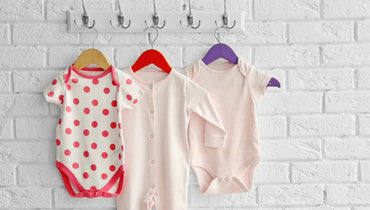Mini Cart
After giving birth, young moms instead of enjoying motherhood, have to lull and feed the baby every single hour. A week after having a lack of sleep, they feel completely overwhelmed and tired. Perhaps, they just don’t know that babies sleep differently than adults. Today, we will talk about the differences between the adult and infant sleeping, and give you some recommendations on how to get baby sleep well.

The Importance of Sleep for Babies
Sleeping is a basic physiological requirement for physical recovery, body growth, brain maturation, learning, and memory. Some babies sleep about 18-20 hours a day during the first days of life, while others sleep only 8-10 hours. These different trends can persist throughout the child’s first year. Here are some interesting facts about baby’s sleep:
- A child wakes up 2-3 times a night on average;
- Newborns sleep 16 hours a day on average. Their sleep is divided into 4-6 episodes per day, separated by relatively short periods of wakefulness;
- The need for sleep varies considerably from child to child. Some babies sleep about 18-20 hours a day during the first days of life, while others sleep only 8-10 hours.
- The number of night feedings decreases significantly during the first year from 3-4 times a night (every 3-4 hours) during the first month to zero by the end of the first year of life.
Key Differences Between the Adult and Infant Sleeping
How the adult sleeps:
Before an adult goes to bed, he helps himself to relax by performing various rituals: reading, listening to music, watching TV, or having sex. When you fall asleep, your brain starts to rest, allowing you to enter a deep sleep phase called non-REM (non-rapid-eye movement). The muscles of the body are relaxed, and the breathing is regular.
About an hour and a half after this phase, the brain begins to wake up and work, so there is a transition from deep sleep to rapid (rapid eye movement, or REM sleep). During this stage, your eyes actually move under your eyelids. You change the position of your hands, sometimes without even waking up. These alternating cycles continue every two hours throughout the night. Thus, an adult can spend an average of six hours in deep sleep and two hours in rapid sleep.
How your child sleeps:
You swing or feed the baby, his eyelids drop, he begins to sleep in your arms. His eyelids continue to move and his breathing is still uneven. If mom puts the supposedly sleeping baby in the crib and quietly leaves the room, at this moment the baby wakes up and cries. This is because he had not yet fallen into a deep sleep, but was in a state of REM sleep. So, to sleep well, babies need help from their parents.
The difference:
If an adult can almost immediately go into the deep sleep phase, then babies in the first months of life enter it through the REM phase. And only after 20 minutes of a deep sleep, they fall asleep and do not wake up so easily if disturbed. A few months after birth, some babies are already moving from one phase to another faster. Learn to recognize this transition, and only then transfer your baby to the crib.
9 Easy Ways to Lull Your Baby
Does the child keep you awake all night? You’ve probably tried everything from the baby massage to singing songs, but you still don’t know how to calm a crying child so that he sleeps for at least a couple of hours. Before you finally give up for the next few years, try these simple ways:
Tip 1: Don’t look in your baby’s eyes
It's a magical feeling when you look into your child’s beautiful eyes. However, if you are just trying to put him to the crib, it is better to exercise a reasonable approach. Long eye contact has a stimulating effect on your baby, which prevents him from falling asleep. So, try to avoid watching in your baby’s eyes when lulling.
Tip 2: Calm bathing
Splashing in water can be fun, but if you bathe your baby before bedtime, you probably want to reach a calming effect. Splashes, singing, various toys, and loud voices excite the child, and then he is not able to fall asleep immediately after the bath. Instead, try turning down the lights, lowering the volume of your voice, put the baby into warm water, and do whatever you can to help your child relax before bed.
Tip 3: Feed your baby while sleeping
It may seem counterintuitive — why would you wake a sleeping baby to feed him when you want him to stay asleep? Well, experts believe that sleeping-feeding your baby helps you make sure he stays full, which means he won’t wake up and scream when hungry in the middle of the night. It makes sense, doesn’t it?
Tip 4: Don’t overdo with decor
Many inexperienced parents find it difficult to stop themselves when shopping. If your family has the same problem, the baby runs the risk of becoming a victim of attractive toys, blankets, pillows, etc. While some of these things can be helpful, they often distract the baby as well, making it difficult for him to sleep comfortably. Leave only the basics in and around the crib if you want things to work out.
Tip 5: Catch the Right Moment
The later you put your child to bed, the sooner he falls asleep, right? Alas, a tired child usually has difficulty falling asleep. That is why it is so important to follow the regime and go to bed at the same time every day. Don’t worry about your baby waking up early if you put him to bed early — falling asleep early can lead to better night sleep and therefore later awakening.
Tip 6. Do not overheat him
Your mother or grandmother probably says that the child should be constantly wrapped up, and by cooling him, you can endanger his life — but this is very far from the truth. Many children find it difficult to fall asleep simply because their bedroom is too warm. If this is your case, try lowering the temperature in your bedroom to about 18-21 °C. You might be surprised how much difference such a small change can mean.
Tip 7: Tight swaddling
If you are usually short on space during your sleep, you will find it difficult to believe that a baby may require slightly less space at night. The fact is that a newborn is used to being in a very limited space (he was quite comfortable with his mother in her womb), so by wrapping him well, you help him feel at home, which contributes to a restful sleep.
Tip 8: Switch on the white noise
Many parents make the mistake of trying to achieve complete silence in their children’s bedroom. This can harm a baby’s sleep. Babies are used to noise: while they were in the mother’s belly, they were constantly surrounded by sounds: heartbeats, sounds of breathing, voices of people outside. Perhaps your child needs a little more noise to fall asleep, which is why you should turn on the white noise or the alternative.
Tip 9: Find what works better
After some time, you will probably be able to discover your tricks to help your baby fall asleep faster. Maybe you need to take a ride in the car, tell a story, or hold the baby on your hands while sitting on the washing machine. Anything that helps you achieve your goal — to lull the baby — is good, even if it looks strange from the outside. If it’s safe and works — use it!
It often happens that we cannot understand why our baby is crying and what disturbs him. Perhaps, he is hungry, cold, or just wants to get body contact with his mother. Another reason for an infant’s nighttime anxiety can be colic, gases, or there may be no reasons for crying at all. Anyway, following the parental instinct and the natural desire to sleep, we try to calm the baby and lull him to sleep. However, this is not always easy.
In Conclusion
Now you know the difference between the adult and infant sleep, which makes you more adaptive to the regime of your baby. If you are concerned about your baby crying all the time, take him to the doctor. The pediatrician will help and advise you on all medical issues. Many babies cry for no particular reason. Some babies cry more than others. So, the next time a baby crying happens, remember two things: it’s not your fault, and the crying will stop someday. Simply stay calm and enjoy the happy moments with your little baby. Good luck!









